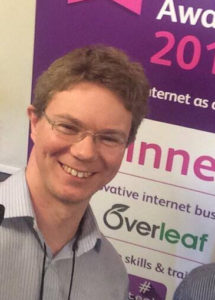Interactions: John Hammersley
Published in Physics
What did you train in? What are you doing now?

My background is in mathematics and physics; I completed an MPhys at Warwick in 2004, before heading up to Durham for my PhD, which I completed in 2008. I then moved out of academia into industry, working for Ultra PRT, the company behind the world’s first driverless taxi system. I joined the company as a research scientist, and my role later broadened out to be bid manager for the various projects the company was involved in.
How did Overleaf start?
When joining Ultra PRT, I was lucky enough to be mentored by Prof. Martin Lowson, a former rocket scientist and aeronautical engineer. He founded Ultra PRT out of Bristol University in the mid-nineties, and always maintained a strong link with academia, encouraging us to write up and share our research into large scale driverless taxi systems with the wider community. This involved collaborations both internally and with others at partner universities/organizations, and it was whilst collaborating on these research papers that we discovered Etherpad, a new browser-based collaboration tool. This made it easy for us to share and collaborate on notes, but because we typically use LaTeX for our papers, it wasn’t quite what we needed.
So one weekend, my co-founder Dr John Lees-Miller built the prototype for Overleaf (then called WriteLaTeX), which allowed us all to collaborate in the browser on LaTeX documents, and would generate a PDF output by compiling the LaTeX on a server. We also found that this greatly lowered the barriers to collaborating with others who were new to LaTeX, as there was nothing to install — all that’s needed is a web browser. Usage of the site continued to grow through word-of-mouth and being featured on sites such as HackerNews, and in late 2012 we decided to found our own company and work on Overleaf full time!
Who is using Overleaf today?
Today over four million people worldwide are using Overleaf! These range from students taking their first steps with LaTeX, through to large scale collaborations between hundreds of the world’s leading scientists. I’m always amazed at the wide range of uses people find for LaTeX and Overleaf. For example, one of the first projects on Overleaf that wasn’t one of our research papers was a set of wedding invitations!
We also see Overleaf helping to extend LaTeX out into fields where it’s less common, such as in the humanities and social sciences (for example, see this a short interview with Brian Lucey, Professor of Finance at Trinity College, Dublin, who started using LaTeX through Overleaf and is now part of our Advisor programme).
We’re also collaborating with partners in the publishing industry to try to help streamline the authoring, submission and publication workflows for journals and preprint servers, by providing updated templates and simple submission links. Overleaf is the natural place for authors and editors to be able to check that all the files for a submission are present, and that there are no compilation errors within a manuscript. Because of the built-in error reporting, and friendly interface, it also helps when there are any problems to resolve!
What I personally find most exciting is that Overleaf is helping students create and share their work in ways not easily possibly before. For example, the ‘Nano Ninjas’ — a group of 7th and 8th Graders in the US — used Overleaf to write up the engineering notebook from their school Robotics challenge! They won an award for their notebook, and have shared it in full on Overleaf as a template for future students to see and take inspiration from!
You can read more about the Nano Ninjas here, and some of their members also went on to form ‘The Three Musketeers’. It’s amazing to see, and hopefully provides an inspiration to future researchers and scientists everywhere :)
What are the main challenges when starting a company? Do you have any advice to share?
There’s a lot I could talk about here! Although, I’m a bit reluctant to start by listing out challenges; you have to be somewhat naively optimistic to start a company, and focusing too much on any perceived challenges can be (wrongly) off-putting. So I’ll focus on advice instead.
If four points is too many, just read point four: don’t run out of money!
- Take everyone’s advice with a pinch of salt: we all give advice based on our own experiences, and in the early days it’s easy to get side-tracked by advice that’s well-meaning, but not relevant for you.
- Talk to people about your idea as early as you can, but don’t be put off if the first people you talk to seem a bit confused as to what you’re proposing. It’s natural, as you’re still developing the idea, and it’ll help highlight where you need to be able to explain your idea more clearly. Early on, you’ll need positive reaction for motivation, early adoption for validation, and any critical feedback for development. But remember to take any advice they give you with a pinch of salt :)
- Focus on solving the immediate problems that you need to get done to get yourself to the next stage (whether that’s finding a co-founder, building the MVP, or getting feedback from your first users), and don’t worry too much about things beyond that. At the start this is focusing one week or one month at a time, and certainly no more than six months ahead. If you focus too much on the long term, you’ll find it takes you too long to get the important stuff done now, and you’ll run out of time/money.
- Finally, and most importantly, it’s the CEO’s main job to make sure you don’t run out of money — whoever the CEO is in your founding team needs know how long you have with initial money you’ve saved/raised to get started, and needs to focus on getting the next funding secured before this runs out. If you run out of money, it doesn’t matter how close you are to solving any of the other problems; that’s usually game over.
I also wrote on a similar topic in a blog for ErrantScience, and in my Reddit AMA from a few years ago. If you’re interested in my longer thoughts on this, those are both good follow-on reads.
If you are starting a company, good luck, and feel free to reach out to me directly if you think I can help! If it’s in the #TechForGood space, I’d also recommend talking to the Bethnal Green Ventures team; they’re very friendly, and have a lot of experience helping start-ups develop in the very early stages. We were part of their summer cohort in 2013, and I still help out as a mentor and alumni!
Do you have a favourite Overleaf tip(s)?
If you’re at a university, check if your institution has a site license for Overleaf! You can see the list of institutions here, and if they do, you’ll be able to get a free upgrade to an Overleaf Professional account through that license!
My other top tip isn’t for Overleaf specifically, but can greatly help if you can’t remember the LaTeX command for a symbol — you can use detexify to find it! Simply draw the symbol, and it’ll give you the corresponding LaTeX command!
Finally, if you’re new to LaTeX itself, we’ve put together this short introduction which can be completed in about 30 minutes, to help you get started. Good luck, and if you do use Overleaf, we’d love to hear from you!



Please sign in or register for FREE
If you are a registered user on Research Communities by Springer Nature, please sign in